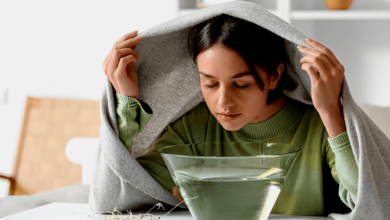8 Natural Remedies for Allergies : How To Stop Allergies

How can I naturally lessen my allergy symptoms? Using nasal sprays, inhaling steam, and consuming herbs and vitamins are examples of natural remedies for allergies therapies.
8 Natural Remedies for Allergies
Allergies are brought on by allergens such mould, dust mites, pollen, and pet dander. If you have an allergy to such innocent things, your body overreacts to them. When exposed to an allergen, histamine is produced, which causes symptoms including watery eyes, sneezing, plugged ears, and a stuffy or runny nose.
You may get all the relief you want from home remedies with very little cost or effort. Read on to learn how to stop allergies immediately with these eight natural remedies for allergies.
Dehumidifier
To assist manage allergy problems in the spring and summer, you might use a dehumidifier. Make sure you empty your dehumidifier every day and clean it on a regular basis with a vinegar solution.
Read More : The 5 Best Probiotic Foods for Gut Health
If the air’s moisture content is between 30% and 50%, dehumidifiers help prevent the formation of mould.Keep in mind that if the air is very dry and you are sensitive to things like pollen or pet dander, your allergy symptoms may intensify. Your skin might become dry and irritated by dry air, which can aggravate your nasal passages.
Essential Oils
Plant compounds condensed into essential oils give calming fragrances and flavours. Essential oils come in a variety of forms, and each one affects the body differently.
For instance, the powerful, piney scent of eucalyptus might intensify steam inhalation. Your nasal passageways and sinuses may be opened with eucalyptus oil.Breathing may feel easier because to the invigorating, menthol-like feeling that the vapour offers.
The following other essential oils might lessen allergic symptoms:
- Frankincense
- Lavender
- Ravensara
- Rosemary
- Sandalwood
Before you go in the shower, try putting a few drops of essential oil in a bowl of steaming water or on the shower floor. Just avoid ingesting the oil or putting it straight on your skin. Eucalyptus oil, for instance, may be hazardous in high concentrations.
HEPA Filters
Filters with high efficiency particulate air (HEPA) capture dust and pet dander, among other airborne irritants, including allergies. To cleanse the air in small areas, certain portable air purifiers are equipped with HEPA filters.
The finest air quality, however, is provided by whole-house systems that integrate HEPA filters into HVAC (heating, ventilation, and air conditioning) systems.In order to prevent mould and mildew development, which aggravates allergies, HEPA filters also remove moisture from the air and flooring.
Herbs and Supplements
Research have shown that certain herbs and supplements may alleviate symptoms associated with allergies, such as:
- Bromelain: This pineapple enzyme may help with breathing and decrease edema.
- Ginger: For allergy relief, you may want to try hot herbal teas with ginger. This herb might be useful in reducing inflammation.
- Quercetin: There is evidence to support the claim that this plant pigment reduces inflammation.
The efficacy of these treatments for allergy symptoms is still being investigated. A lot of supplements haven’t had their impact on kids, expectant mothers, or nursing mothers studied.
Remember that the Food and Drug Administration only little controls dietary supplements. Individual differences exist in the effects of supplements, which are contingent upon several factors such as supplement kind, dose, frequency of usage, and potential interactions with existing drugs. Before beginning any supplementation, consult a pharmacist or healthcare professional.
Nasal Spray
Nasal steroid sprays alleviate sneezing, open nasal passages, and reduce inflammation. They also assist with runny or congested noses.The majority are sold over the counter. Keep in mind that prolonged usage of nasal steroid sprays might lead to headaches, dry up your nasal passages, and cause nosebleeds.
Neti Pot
Neti pots are becoming a common treatment for sinus congestion and allergies. During this procedure, a saline solution is used to clean your nasal cavity, clearing mucus and eliminating allergies.
A Neti pot is easy to use. Pour salt and warm water into the saucepan; you may prepare this combination yourself or purchase premeasured packages. Pour the fluid into one nostril until it oozes out the other while tilting your head to the side. On the other side, repeat the procedure. Before and after using your Neti pot, clean it.
Showering
A hot, steamy shower might help open up your nasal passages and temporarily relieve sinus congestion. After being outside, giving yourself a brief rinse may help rid your skin and hair of allergies. Just watch out that the water doesn’t become too hot, since it might cause burns.
Recall that if you have been gardening, weeding, or pruning, to take off your shoes and clothing immediately and take a shower.By taking a shower, you may stop pollen from getting on your bedding, clothing, furniture, and other surfaces.
Steam
Other ways to inhale steam, such as vaporizers purchased from stores, work almost as well as showers in clearing mucus and hydrating dry nasal passages. According to research, steam inhalation helps clear the nasal passages, which in turn relieves sneezing, face discomfort, and runny nose.
Try filling a dish or other container with hot water. For five to ten minutes, cover your head with a towel to create a tent, and take deep breaths through your nose. To prevent burning yourself, take care not to put your face too near the water. This might be a more convenient approach than having many showers every day.
Avoid Triggers
Steer clear of triggers as much as possible to treat allergies. By reducing your exposure to allergens, this tactic aids in symptom prevention. If you have a pollen allergy, for instance, you may wish to remain indoors on dry, windy days. The quantity of pollen in the air is increased by certain meteorological conditions.
Other ways to avoid triggers include:
- Don’t put wet towels and clothes in a hamper.
- If at all possible, avoid lying on fabric or upholstered furniture.
- If you can, install hardwood or another kind of hard flooring in your house.
- Keep your home’s windows and doors closed.
- Be aware of the trees and plants you are sensitive to, and avoid planting them close to your house.
- Ensure that the sinks and bathtub are clean.
- Regularly change the filters on your furnace and air conditioner.
- Opt for pull-down shades instead of blinds with slats or fabric as they gather less dust.
- When gardening, mowing the lawn, or cutting the grass, use a high-quality mask.
- Cover your mattress and sheets with mite-proof materials.
Considerations
If none of the home cures work to relieve your symptoms, see a healthcare physician to find out what alternative solutions could be helpful. They may prescribe leukotriene inhibitors or suggest antihistamines and decongestants. This drug prevents your body from releasing chemicals in reaction to allergens.
If your symptoms are severe, you may need immunotherapy, which involves allergy injections. In order to help your body develop tolerance to an allergy, a medical professional will inject a little quantity of the allergen. It usually takes three to five years for this therapy to achieve full impact.
Anaphylaxis
A potentially fatal response to an allergy is anaphylaxis. The most common causes of this acute allergic response include food allergies, medication allergies, and insect stings and bites. Although it is uncommon, dust mites, mould, pet dander, and pollen may cause anaphylaxis in some individuals.
Read More : The Incredible 9 Health Benefits of Tomatoes: A Nutrient-Packed Superfood
Seek medical attention right away if you or someone else develops anaphylaxis. Symptoms include:
- Chest and abdomen aches
- Breathing in high-pitched noises and coughing or wheezing
- Vomiting, nausea, and diarrhea
- I’m feeling lightheaded
- palpitations in the heart
- Hives and red, itchy skin
- swelling of the mouth, cheeks, and eyes
- Difficulty swallowing and breathing
How To Allergy-Proof
By altering your lifestyle, you may avoid and minimize allergy symptoms as much as possible. Here are some tips for making your house allergy-proof:
- If the weather is dry, hot, or windy, stay inside.
- Make sure you frequently clean your house to prevent mould development or dust accumulation.
- Get rid of upholstered furniture, rugs, and fabric.
- Install filters for the furnace and air conditioner.
- Keep your dogs in rooms apart from your sleeping and eating areas.
If you have a pet dander or pollen allergy, use a humidifier to maintain the moisture - levels in the air in your house.
- If you have a mould or dust mite allergy, use a dehumidifier to lower the moisture content in your house.
Natural allergy relief methods include utilizing essential oils and nasal sprays, inhaling steam, and consuming herbs and vitamins. If they don’t help or your symptoms become worse, you could think about seeing a doctor. They may suggest allergy injections in extreme circumstances, decongestants, or antihistamines.











